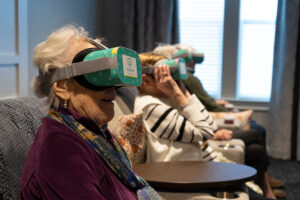By David Wilkening, Contributing Writer

SOMERVILLE – When CEO Kyle Rand began his technology start-up Rendever in 2016, virtual reality (VR) was still primarily associated with video games. So how would often technology-doubting older people react to their own version of virtual reality offered by Rand’s company?
“Amazing,” is one word Rand uses for the reaction of older people who are sometimes characterized as resistant to technology favored by younger users. Once exposed to it, older users become, as he noted, his company’s “best ambassadors, encouraging their friends and neighbors to try it.”
Rendever is a company whose products are targeted to the elderly. Its stated mission is to “overcome social isolation through the power of virtual reality and shared experience.”
“VR is helping organizations (such as senior living places) realize the potential of virtual tours though immersion,” according to BigBuzz, an advertising agency with many technology clients. “Companies like Rendever are at the forefront of this digital transformation.”
The benefits of VR
VR is computer technology that simulates a real or imagined environment so that the user can interact with it as if physically present.
The evidence is clear that older users have taken to a technology once known mainly to video game users. They are also deriving obvious benefits from it. Research from the Massachusetts Institute of Technology AgeLab found older adults who used a VR system were more likely to feel positive about their health and emotions. They were also less likely to feel socially isolated than those viewing similar content on television.
VR has taken great leaps forward in recent years with improved technology that includes wireless headsets and a growth in the library of materials available. Headsets or goggle-like covers over a user’s eyes are a critical element in VR. And so are computer-generated images or environments.
One of Rendever’s claims to fame is having one of the largest libraries of VR experiences. It releases new themed experiences on a bi-weekly timeline, often based on holidays, seasons and requested topics.
Rand points out that childhood homes are among the most requested topics of VR. But so are personal recollections such as weddings and other events. Personal experiences can include seeing photos of friends and family at social events.
VR options also allow users to travel the world, such as taking a trip to Paris or London, and to have sometimes thrilling experiences such as skydiving. Family members are sometimes startled to hear older members or grandmothers describing a boat ride in raging rapids
Families often want repeat performances
“Family members may be a little worried initially but once they understand what we’re doing or experience it themselves, they get extremely excited,” Rand explained. The usual reaction after the first time: they want to try it again.
Rendever has simplified the experience for users at well over 100 senior care centers, hospitals and other institutions. There is no cost for participants or their families, who are frequent companions on the trip. Communities pay for it.
An always-popular subject for VR experiences is hometowns. A Rendever team described the experience of an Ohio woman making a return visit to hers with her family. “She immediately welled up with emotion and started sharing stories about the house, neighborhood and everything she loved about the town. The whole room was in tears.”
The therapeutic value of VR encounters is obvious. One story describing it involved a hospitalized elderly man struggling with dementia. He was slouched over in his wheelchair, unmoving, his eyes closed. His experience was a three-dimensional painting by Vincent Van Gogh with a classical piano playing in the background. “What happened next stunned everyone in the room,” according to the Rendever team. “He just came alive. He started moving around. He was all of a sudden much more engaged in the world.”
Growing up with an interest in the elderly
The boyish-looking Rand grew up in frigid upstate New York. But after graduating from Duke University with Biomedical/Engineering and Neuroscience degrees, he moved to Boston to take on several jobs as a developer. One of his experiences was as a developer/program analyst for the Brigham and Women’s Hospital in Boston, where he was instrumental in various creative programs such as a sleep apnea study.
Rand was unusual in his lifelong interest in older adults. He was particularly close to his two grandmothers. He recalls spending a week with his expectant mother and grandmother at a hospital in Rochester. They were trapped because of a snowstorm.
The Rendever program thrived during the pandemic. But his interest in the senior care industry began long before that. He and his friends volunteered each summer for elderly care. He also studied cognitive decline in the aging population at Duke.
“Growing up, I volunteered and scooped ice cream for my local senior living community. One benefit was getting unlimited free ice cream,” he joked.
One of Rand’s grandmothers died while he was in his first year at Duke. Her negative experience with senior care was a strong influence on his interest in seniors.
He became acquainted with elderly social isolation and chronic loneliness. Among them: a 2015 study published in Perspectives on Psychological Science that found long-term social isolation and loneliness led to health effects comparable to smoking 15 cigarettes a day. Another study around the same time found that loneliness increased the risk of strokes and coronary heart disease by 30 percent.
VR may not exactly be the real world, but it appears to provide some of the same benefits.
RELATED CONTENT:
Pets have the power to improve our health and well-being (fiftyplusadvocate.com)
Woburn’s Cummings Foundation supports older adults in a variety of ways (fiftyplusadvocate.com)












